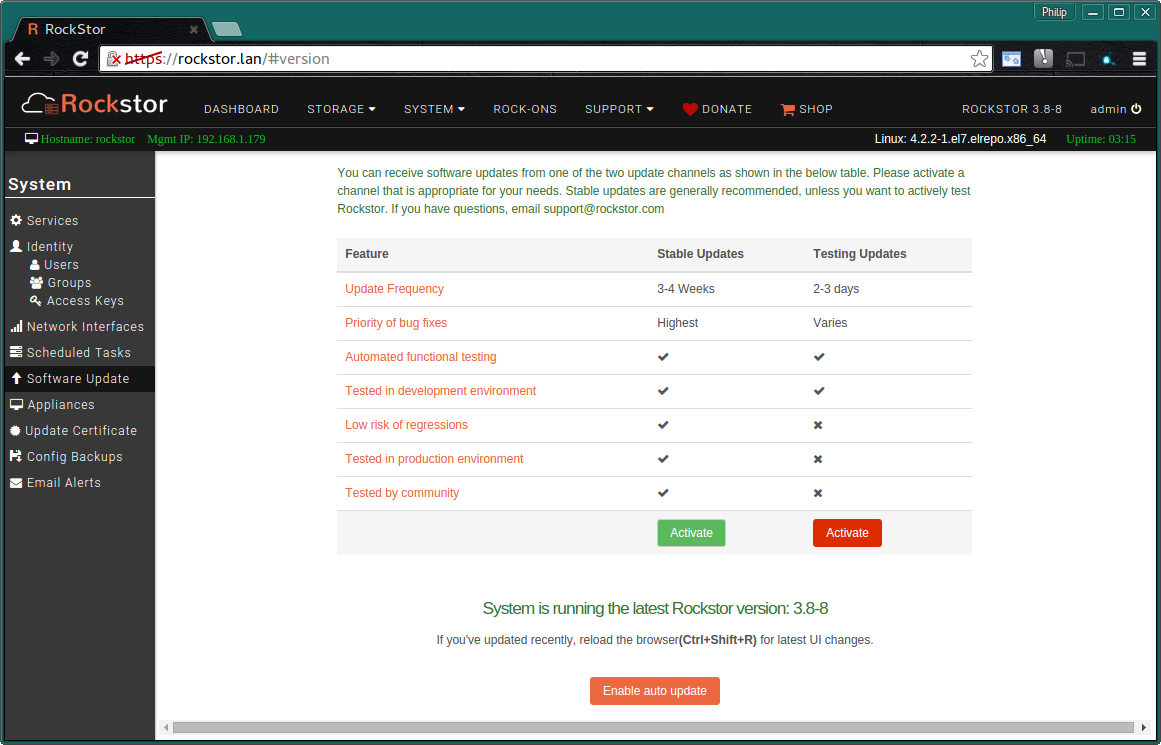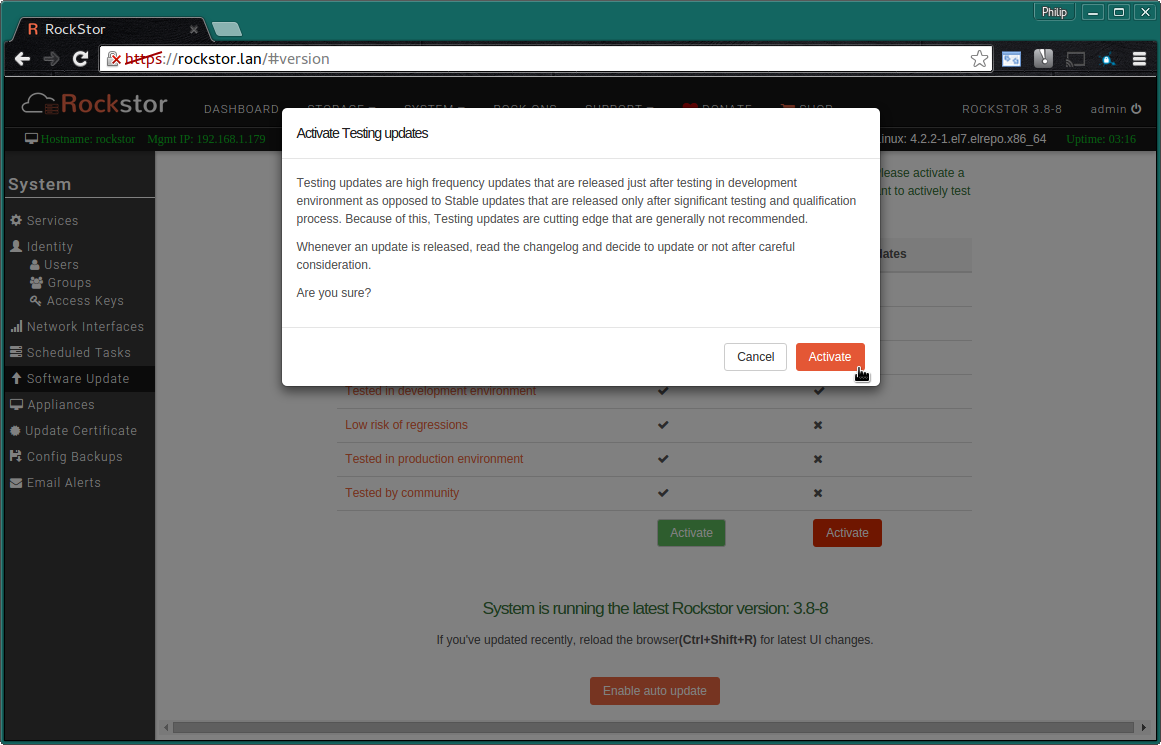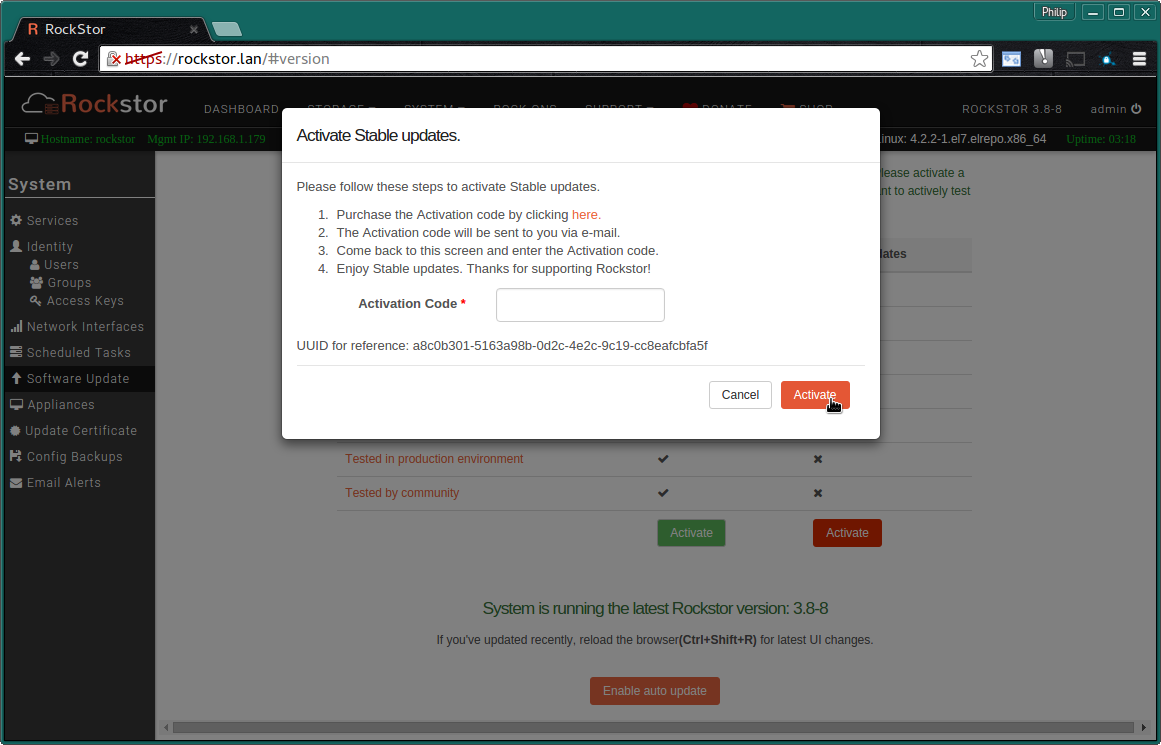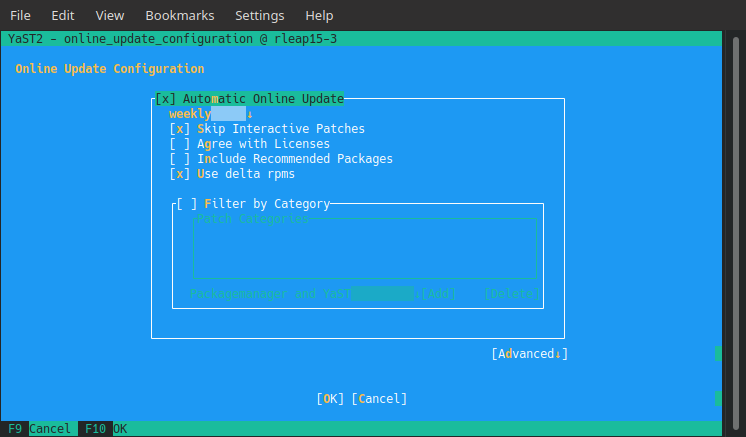Software update¶
Licensed: FSF Free/Libre & OSI approved¶
The Rockstor package code, as distributed, is developed under two main repositories:
Source0: rockstor-core is GPL-3.0-or-later licensed.
Source1: rockstor-jslibs is (MIT AND Apache-2.0 AND GPL-3.0-or-later AND LGPL-3.0-or-later AND ISC) licensed. Indicating the combined works in this jslibs repository.
Making the package license, as per the Fedora Project Wiki (Packaging:LicensingGuidelines):
“GPL-3.0-or-later AND (MIT AND Apache-2.0 AND GPL-3.0-or-later AND LGPL-3.0-or-later AND ISC)”
See the SPDX License List for details on the above assertions.
As such, Rockstor the package is fully Open Source; there is no contributor agreement, and everyone is encouraged to help in what ever way they can. It is very much developed in the open with key decisions made by the community and their interaction with Rockstor contributors and maintainers. See: Our Endeavour. This flow of ideas and open development is held as a founding principal and is instantiated in the Rockstor forum and within the code itself on GitHub.
The Rockstor Project embodies an identifiable software maintainer and coordinator of the Open Source product that is the scheduled Rockstor releases. It also forms an identifiable entity necessary for the support of the releases (where needed) and infrastructure necessary to maintain the open development that is essential in modern non trivial software appliances that have any hope of qualifying as future-proof.
After an initial development of 2.5 years the sustainable nature of this endeavour was approached and redressed in a thread on the community forum. The consensus was to adopt a two-tiered updates model; Testing and Stable.

The update alternatives offered in Rockstor.
Testing Channel¶
The testing channel for updates is intended primarily for developers or for those who wish to actively test Rockstor and who are entirely happy on the developmental edge of releases. There is growing unit test coverage that all releases are expected to pass prior to their release, but, given the rapid nature of these releases weekly or shorter, it is not recommended to put production systems on this update channel. The flip side is that a rapid release cycle affords fast development and widespread field testing of what ultimately becomes the Stable Channel at curated points.
However, it must be understood that appliance development is a complicated business and it is inevitable that along the way, fixing one thing will break another. All reasonable efforts are made to avoid obvious breakage. But ultimately this testing channel is intended to find problems by way of tester/developer reports and collaboration and will involve partially implemented features of an experiment nature. The intention is to provide a feature testing platform that we can gradually stabilise before then releasing it’s stable channel spin offs at known good points.
Participation in the testing channel along with considered bug, code, or documentation contributions is the heart of Rockstor development and along with patience and understanding can only benefit all those involved. Please see additional benefits.
No charge

There is really no better testing alternative than thousands of willing testers putting a proposed product to uses that were never envisaged by its developers; and when those testers/developers see rapid iteration in the problems they find/fix and report, everybody wins. It’s the classic Bazaar model described in CatB.
Stable Channel¶
This is the recommended channel for Production Rockstor use. The frequency of releases is much lower (monthy or longer) than those in the Testing Channel and there is the reassurance that updates in the stable channel have been field tested first in the testing channel. This channel will receive the highest attention with regard to bug fixes, whereas the testing channel is more focused on development rather than refinement. There will also be greater attention paid to avoiding regressions from one stable channel release to the next.
Below we see the process involved in setting up the stable channel updates. A link is provided to The Rockstor Project Open Collective showing the Stable Updates subscription membership option. Upon membership the activation code will be emailed to the address given. This code is intended for the dialog shown below. Also note our Testing Email section where the Appliance ID, a UUID generated during install, is contained within the test email. The appliance ID is used to identify an individual install and when paired with an activation code configures stable channel access.
N.B. When re-installing on a different motherboard, or where the boards product_uuid is non unique, a different appliance id will result. This means the prior installs activation code will no longer work against the new appliance id. For this circumstance we have our in public beta test Appliance ID manager (appman). Please be patient as we work our the teething problems expected with newly release systems. Specific documentation will follow once we have established the less self explanatory elements.
Participation in the stable channel is key to the future of Rockstor development. The ability to continue to improve and provide future-proof services, by way of advanced file system facilities made easy, is dependant on a financial component. The stable channel, and it’s associated Paid Support option, is that financial component. See our Open Collective non-profit for the current cost of a Stable Updates subscription members.
Please keep an eye on our friendly forum as discount / promotional codes are occasionally issued.
Yearly subscription managed by appman

Rockstor project repositories: contributors qualify for up to 10 personal use activation codes.
Auto Updates¶
Rockstor’s current Web-UI does not include auto updates configuration. Although such a facility is planned by way of a YaST2 wrapper. Pull requests, as always, are welcome; see: Contributing to Rockstor - Overview.
In the interim the well proven YaST2 can be used directly. See Automatic online update. A minimum (60 MB) console only YaST2 can be installed via:
zypper install --no-recommends yast2-online-update-configuration
and the resulting online update module invoked there-after via:
yast2 online_update_configuration

The above shows the default settings once Automatic Online Update is selected (Alt+m). Use the onscreen instructions to make any required changes.
When enabled, all qualifying updates are auto installed at the chosen interval. This is only recommended when on the Stable Channel. The Testing Channel, due to it’s developmental nature, is likely to break.
N.B. Rockstor is not necessarily compatible with other YaST modules. Although again pull requests are welcome in this regard.
